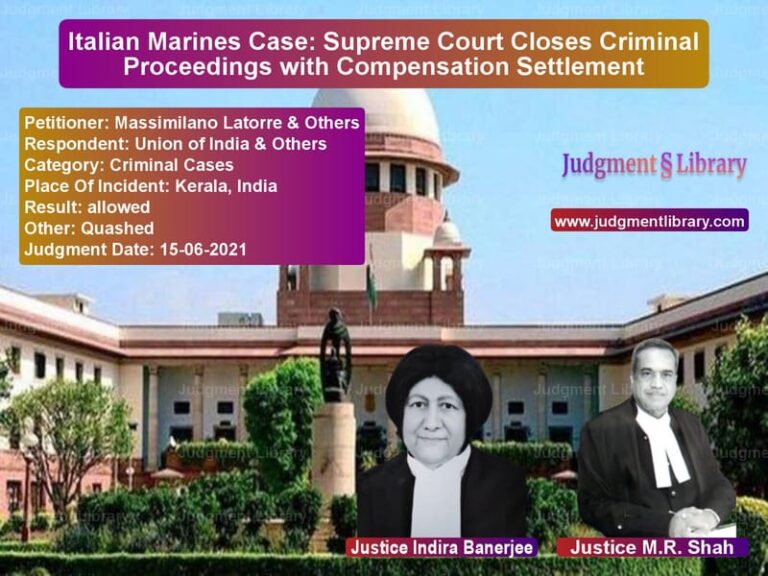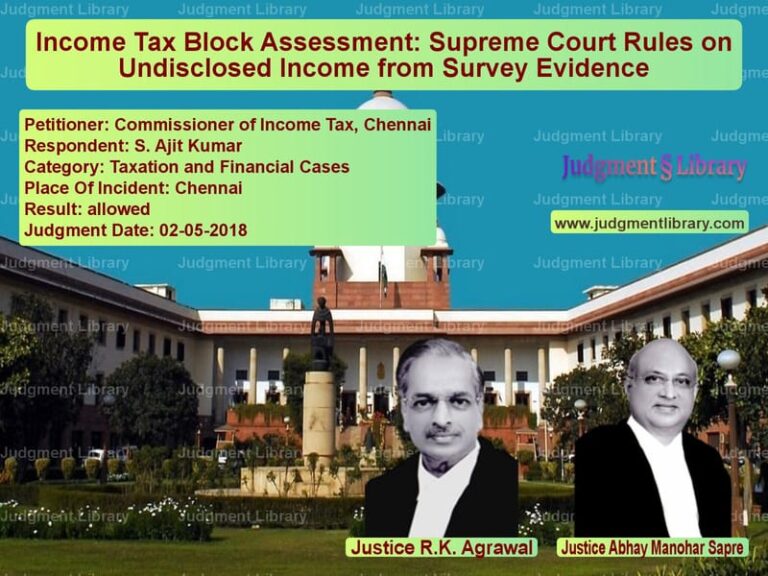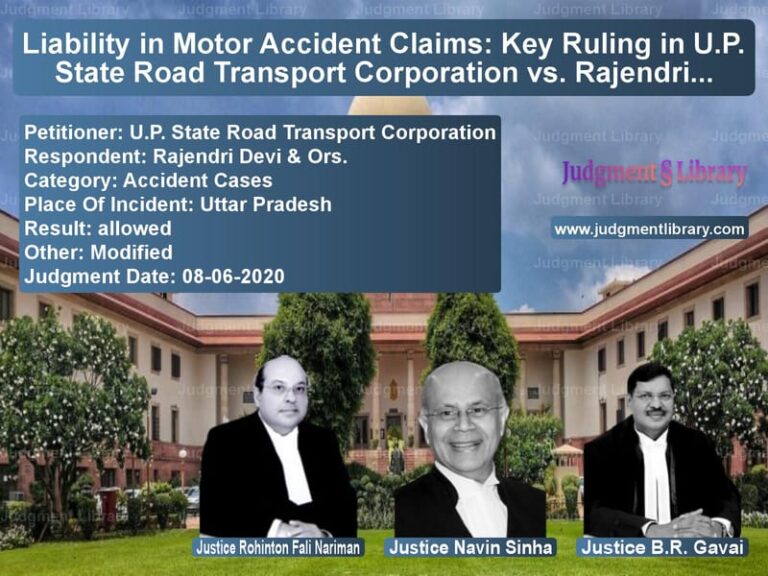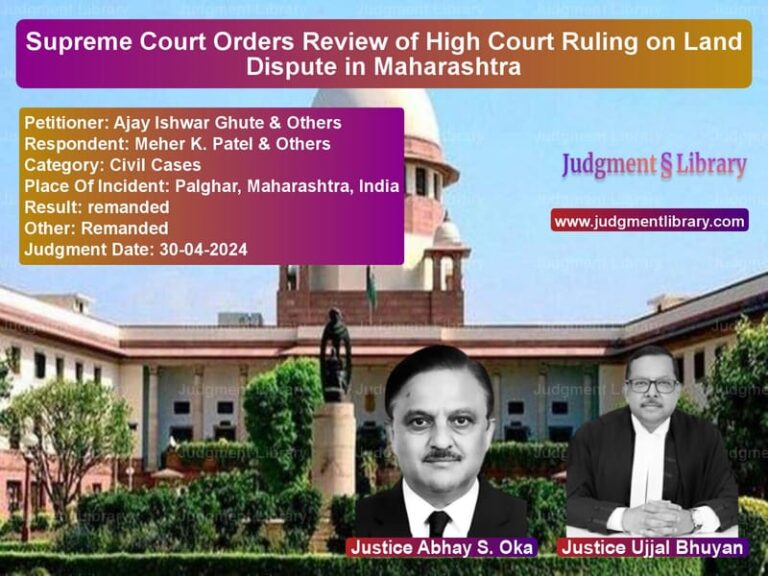Tax Exemption and Deferment: Supreme Court Ruling on Tata Steel vs. State of Jharkhand
The case of State of Jharkhand & Others vs. Tata Steel Ltd. & Others deals with the tax exemption and deferment policies for industries under the Bihar Finance Act, 1981. The Supreme Court examined whether Tata Steel was entitled to continue its tax exemption benefits after the formation of the State of Jharkhand following the bifurcation of Bihar.
Background of the Case
M/s Tata Steel Ltd., the first respondent, established a manufacturing unit in Dhanbad, Bihar (now Jharkhand) for the production of iron and steel products. To promote industrial growth, the State of Bihar formulated an industrial policy on December 22, 1995, which provided tax exemptions and deferment benefits for industries that commenced production between September 1, 1995, and August 31, 2000.
As part of this policy, industrial units were eligible for an eight-year sales tax exemption. Tata Steel proposed to invest Rs. 2000 crores to install a cold rolling mill in Jamshedpur. After several meetings and negotiations, the State of Bihar assured the company that it would receive tax exemptions as per the industrial policy.
Bifurcation of Bihar and Jharkhand’s Policy Shift
Following the enactment of the Bihar Reorganisation Act, 2000, Jharkhand was carved out as a separate state on November 15, 2000. The Governor of Jharkhand issued a notification stating that all Bihar laws, including the 1981 Act, would continue to be in force in Jharkhand.
On December 21, 2000, Jharkhand issued an exemption certificate under the Bihar Finance Act, 1981, confirming tax exemptions for Tata Steel’s cold rolling mill. However, the Commissioner of Commercial Taxes, Jharkhand, initiated a suo motu revision under Section 46(4) of the Bihar Finance Act and held that Tata Steel’s hot rolled (HR) products and cold rolled (CR) products were the same commodity. Based on this reasoning, the Commissioner denied tax exemption.
Petitioners’ Arguments (State of Jharkhand)
The State of Jharkhand argued:
- The HR and CR products were the same, and hence, tax exemption was not applicable.
- Jharkhand was not bound by the promises made by Bihar before the state bifurcation.
- The Commissioner of Commercial Taxes had the authority to review and revise previous exemption certificates.
- The exemption policy did not automatically transfer to Jharkhand without new approvals.
Respondents’ Arguments (Tata Steel Ltd.)
Tata Steel countered:
- HR and CR products were different commodities as per industry standards.
- The exemption certificate issued by the State of Jharkhand was legally valid.
- The company had invested Rs. 2000 crores in reliance on the industrial policy and was entitled to promissory estoppel.
- Revoking the exemption was unfair and violated the principles of natural justice.
High Court’s Judgment
The Jharkhand High Court ruled in favor of Tata Steel and held:
- HR and CR products were commercially different, and hence, tax exemption applied.
- The State of Jharkhand could not go back on the commitments made under the Bihar industrial policy.
- The withdrawal of exemption was arbitrary and violated the principle of promissory estoppel.
Supreme Court’s Analysis
The Supreme Court examined several key points:
1. Promissory Estoppel
The Court ruled that the doctrine of promissory estoppel applied in this case. It held:
- Jharkhand was bound by Bihar’s commitments before bifurcation.
- Tata Steel had made significant investments in reliance on Bihar’s policy.
- Governments cannot withdraw incentives arbitrarily once commitments have been made.
2. Classification of HR and CR Products
The Court analyzed whether HR and CR products were different. It noted:
- Expert evidence confirmed that HR and CR products have different metallurgical properties.
- The manufacturing process of HR and CR products is distinct.
- As per commercial usage, HR and CR products were separate commodities.
Based on these findings, the Court ruled that Tata Steel was eligible for tax exemption.
3. Conversion to Tax Deferment
After the Jharkhand Value Added Tax (JVAT) Act, 2005, all tax exemptions were converted to tax deferment. Tata Steel filed for deferment, but the State rejected the application.
The Supreme Court ruled that the company was entitled to deferment under Section 95(3)(ii) of the JVAT Act and directed Jharkhand to allow deferment of tax for the remaining period.
Final Judgment
The Supreme Court ruled:
- The withdrawal of tax exemption was unconstitutional and was struck down.
- The State of Jharkhand was directed to allow deferment of tax under the JVAT Act.
- Jharkhand was bound by Bihar’s industrial policy under the principles of promissory estoppel.
- The State’s argument that HR and CR products were identical was rejected.
Impact of the Judgment
This judgment establishes key principles:
- Government policies are binding commitments when investors make decisions based on them.
- Tax incentives and exemptions cannot be revoked arbitrarily after investments are made.
- The classification of goods for tax purposes must follow commercial and technical distinctions.
Conclusion
The Supreme Court’s decision in State of Jharkhand vs. Tata Steel Ltd. is a landmark ruling on tax exemption and deferment. It reinforces the doctrine of promissory estoppel and ensures that state governments honor past commitments to industries.
Don’t miss out on the full details! Download the complete judgment in PDF format below and gain valuable insights instantly!
Download Judgment: State of Jharkhand & vs Tata Steel Ltd. & Ot Supreme Court of India Judgment Dated 12-02-2016-1741852603881.pdf
Direct Downlaod Judgment: Direct downlaod this Judgment
See all petitions in Income Tax Disputes
See all petitions in Tax Refund Disputes
See all petitions in Banking Regulations
See all petitions in Judgment by Dipak Misra
See all petitions in Judgment by N.V. Ramana
See all petitions in partially allowed
See all petitions in Modified
See all petitions in supreme court of India judgments February 2016
See all petitions in 2016 judgments
See all posts in Taxation and Financial Cases Category
See all allowed petitions in Taxation and Financial Cases Category
See all Dismissed petitions in Taxation and Financial Cases Category
See all partially allowed petitions in Taxation and Financial Cases Category







